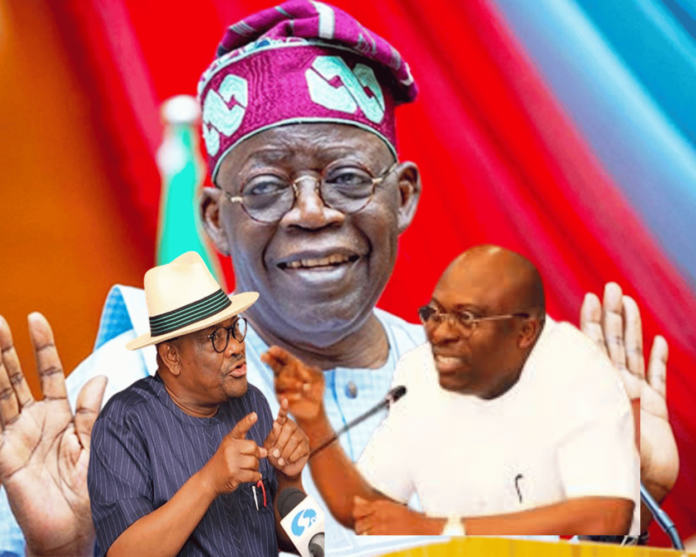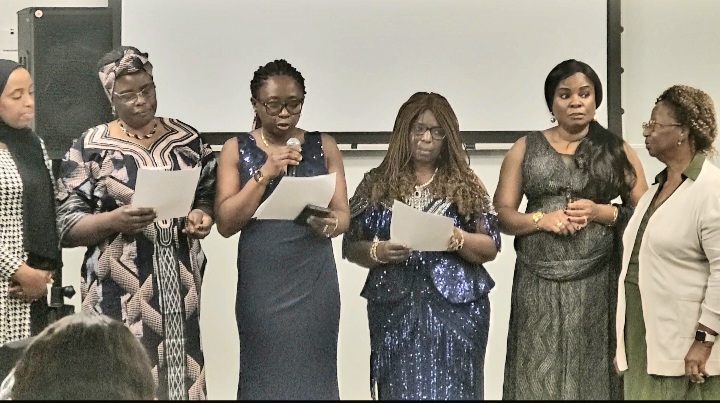Why Nigeria’s President Suspended the Governor and What It Means for the Country
On March 18, 2025, President Bola Tinubu took a shocking step by declaring a state of emergency in Rivers State. This decision, which has shaken Nigeria’s political landscape, led to the suspension of Governor Siminalayi Fubara, his deputy Ngozi Odu, and all state lawmakers for six months. In their place, Tinubu appointed retired Vice Admiral Ibokette Ibas as the new state administrator. The announcement, made during a nationwide broadcast, followed months of conflict between Fubara and his former political mentor, Nyesom Wike, now the Minister of the Federal Capital Territory (FCT). But why did Tinubu wait so long to act? And does this move favor Wike and the ruling All Progressives Congress (APC)?
What Led to the Emergency Declaration?
Tinubu justified the decision by pointing to the ongoing crisis in Rivers State. He claimed governance had collapsed since 2023 due to the battle between Fubara and Wike. He blamed Fubara for demolishing the state House of Assembly building in December 2023 and failing to rebuild it, calling it a direct attack on democracy. Tinubu also cited increasing security threats, including pipeline vandalism by militants, accusing Fubara of ignoring the problem. He leaned on a Supreme Court ruling from February 28, 2025, which criticized Fubara for running the state without a functioning legislature. Using Section 305 of Nigeria’s 1999 Constitution, Tinubu declared the emergency, saying it was necessary to restore order.
No good and responsible President will standby and allow the grave situation to continue without taking remedial steps prescribed by the Constitution to address the situation in the state.
Tinubu said in the broadcast
Since Nigeria’s return to democracy in 1999, Tinubu is the third president to use Section 305 of the Constitution. Former President Olusegun Obasanjo used it twice during his eight-year term—in Plateau (2004) and Ekiti (2006). In 2013, during a period of insurgency, ex-President Goodluck Jonathan also applied it in Adamawa, Yobe, and Borno States.
At that time, Tinubu, who was the National Leader of the now-defunct Action Congress of Nigeria (ACN), criticized Jonathan’s decision, calling it a “dangerous trend” in governance and suggesting it had political motives.
However, many see this President Tinubu’s declaration of emergency as more than just a governance fix. Suspending elected officials and replacing them with a military figure when your minister instigating the chaos is not punished, looks like a political takeover. Critics, including the opposition Peoples Democratic Party (PDP) and former Vice President Atiku Abubakar, have condemned it as an “assault on democracy.” They argue Tinubu overstepped his powers and is punishing Fubara to protect Wike.
Why Did Tinubu Wait So Long to Act?
The conflict between Wike and Fubara started shortly after Fubara took office in May 2023. Wike, his former political godfather, expected loyalty, but Fubara resisted his control. By October 2023, Wike’s allies in the state legislature tried to impeach Fubara, splitting the assembly. Twenty-seven lawmakers defected to the APC, leaving Fubara with just four supporters. Violence erupted, government buildings were burned, people died, and chaos spread. Despite earlier mediation efforts, including a Ramadan meeting with both men, Tinubu stayed silent.
Some believe Tinubu had political motives for delaying action. Wike, originally a PDP leader, played a key role in Tinubu’s 2023 presidential victory by crossing party lines. By allowing the crisis to drag on, Tinubu may have weakened Fubara’s position while strengthening Wike’s influence. Political analysts, including former Rivers Commissioner Austin Tam-George, suggest Tinubu only acted when the situation created an opportunity to justify a takeover. Others argue Tinubu feared stepping in too soon could worsen tensions in the Niger Delta, but his inaction allowed violence to escalate.
Does This Move Favor Wike and the APC?
Many believe Tinubu’s actions show clear favoritism. His speech mainly blamed Fubara, while Wike’s role in fueling the crisis was downplayed. The Supreme Court ruling Tinubu referenced effectively supported Wike’s 27 defected lawmakers. Additionally, suspending Fubara while keeping Wike untouched looks like a political reward for the minister’s loyalty.
The APC’s long-term strategy is also in question. Rivers State has traditionally been a PDP stronghold, but Wike’s defection in 2023 signaled a shift. By sidelining Fubara, Tinubu may be clearing the way for APC dominance ahead of the 2027 elections. Critics call it “state capture”, a deliberate move to take control of Rivers through political manipulation. Wike himself has hinted at this, boasting about “two-zero” victories over Fubara and pledging to deliver Rivers to Tinubu in the next election. Even local political figures like Tonye Cole see Wike’s influence at play, yet Tinubu’s intervention only punishes Fubara’s side.
Why This Crisis Matters Beyond Politics
This power struggle is not just about political rivalries, it has serious national consequences. Rivers State is one of Nigeria’s economic powerhouses, contributing a significant portion of the country’s oil revenue. Ongoing violence and instability could disrupt oil production, impacting Nigeria’s already struggling economy. The situation has already led to over a dozen deaths, and militant groups are threatening further attacks on pipelines.
Security experts warn that political violence in Rivers could spread to other states. The Niger Delta has a history of armed insurgencies, and this crisis could reignite those tensions. The International Crisis Group’s Nnamdi Obasi has cautioned that instability in Rivers could lead to more weapons in circulation and an increase in criminal activity. Tam-George, speaking on Arise TV, warned that Tinubu’s emergency declaration might escalate the crisis rather than resolve it, as the ideological divide between Wike and Fubara remains deep.
How Are Rivers Residents Reacting?
On the ground, emotions are running high. Fubara’s supporters see the move as blackmail, while Wike’s camp celebrates. Traditional rulers, once powerful mediators, have been sidelined; some even face threats for backing Fubara. Business leaders, like Tonye Cole, are calling for negotiations, but Tinubu’s declaration has overshadowed these efforts.
Ordinary citizens feel helpless. Many have taken to social media to express frustration. “Rivers is a pawn in Tinubu’s game,” some say. The common sentiment is that governance in Rivers has collapsed, and people are paying the price.
Is Ibas an APC Member?
There’s no hard proof that Vice Admiral Ibokette Ibas is a card-carrying member of the All Progressives Congress (APC). Ibas, born in 1960 in Cross River State, built his career in the Nigerian Navy, serving as Chief of Naval Staff from 2015 to 2021 under President Muhammadu Buhari, an APC leader. His military record, which focused on fighting piracy and oil theft in the Niger Delta, shows no overt political party ties. Some point to his appointment as a sign of partisan loyalty. Military officers in Nigeria are legally barred from party politics while active, and Ibas retired in 2021, leaving room for post-service affiliations. But no concrete evidence, like an APC membership card or statements from the party, ties him directly to it as of now. Tinubu’s choice of Ibas could be strategic. The Wike-Ibas connection is where rumors heat up, but evidence is thin. Wike, Rivers governor from 2015 to 2023, overlapped with Ibas’s naval tenure.
What’s Next for Rivers and Nigeria?
President Tinubu’s emergency declaration might seem like a solution, but it raises more questions than answers. Was it truly about restoring order, or was it a strategic move to consolidate power? Waiting months before acting gave Tinubu the political leverage to step in forcefully, but this approach is risky. If it backfires, it could trigger widespread unrest, damage his credibility, and destabilize the Niger Delta.
For now, Rivers is a battleground, not just for political control but for the future of Nigerian democracy. Can Nigeria maintain democratic integrity when leaders pick political sides over governance? The answer is unfolding in the streets of Port Harcourt, and the stakes couldn’t be higher.






